
28 Aug Meet Russell Thomas
By Ephraim Nkonya
When Jesus saw Nathanael approaching, he said of him, “Here truly is an Israelite in whom there is no deceit.” (John 1:47). This is what you see when you meet Russell Thomas for the first time. His slender build, humble posture, the smiley face that he always wears, and the soft and gentle voice that proceeds out of his mouth tell a full story of who he is. I first met Russell in January 1986 in Morogoro and we have since become family friends. I was then a student at Sokoine University of Agriculture and he was the treasurer of the Tanzania Adventist Press (TAP) based at Misufini in Morogoro town. We met again in 1996 in the Manhattan, Kansas church, where he came to preach. He immediately recognized me, and to the surprise of his congregation, he greeted me in Swahili “Hujambo ndugu? Habari za siku nyingi?” which means, “How are you my brother? How have you been?” He then explained to the congregation what he was saying and gave a short story of our time in Morogoro 10 years previous. Russell and family speak fluent Swahili and have adopted our beautiful country as their second home.
Russell’s story of service to the Lord is very special, as it is about implementing Jesus’ great commission of spreading the word of God to the whole world. Russ was called to publish and his e-signatures tell it all. Here is a sample of his three e-signatures in recent years, which illustrate his commitment to the Great Commission:
“And the gospel must first be published among all nations.” — Jesus Mark 13:10
“Write the vision and make it plain upon tables, that he may run that readeth it.” Habakkuk 2:2
“Some will be reached by our literature who would not be reached in any other way.”–Testimonies, vol. 8, p. 87.
One would wonder, is there future for the print media, which has been dying following the explosion of internet and electronic media? For example, from 2000 to 2015, print media advertising revenue in the US fell by 200% from about $60 billion to only about $20 billion. Well, to Russ and his colleagues, these changes are not a problem, but an excellent opportunity to serve the Lord. While advertising revenues have dropped, and newspaper circulation has plummeted, surprisingly, book sales in the United States have made new records each year for the past 20 years.
Childhood
Russ was born in South Bend, Indiana to mother Faith and father Russell Clare Thomas. Father was a literature evangelist trainer who traveled much, but mama kept the family strong, maintaining the two family devotional times every day, one before breakfast and another in the evening immediately after supper. This built a strong faith foundation under Russ and his siblings. Yes, what we read in Proverbs 22:6 Train up a child in the way he should go, And when he is old he will not depart from it worked very well because Russ not only became a gentleman with “no deceit”, but followed his father’s footsteps. His two brothers and one sister all walk in the light of the Three Angels’ Message.
The family lived then at Andrews University in Berrien Springs Michigan where his father was doing a degree in theology and business. Russ is a third generation Adventist, as both parents were second-generation Adventists from large families.
As one would expect, Russ’s parents raised their kids in a strict Adventist upbringing. Mama and papa loved dearly their kids and followed the principle of Proverbs 13:24 – He that spareth his rod hateth his son: but he that loveth him chasteneth him betimes. Just like any other boy, Russ did many foolish things – not showing respect, playing with fire and other mischievous acts. One of the mischievous episodes that he remembers to have done, he and a younger brother figured out how to open the neighbor’s kerosene tank. They opened the tank, poured the kerosene in a line on the ground, then lit the ground with a matchstick to watch the fire follow the path. But they got braver and the fires were bigger each time they did it, finally drawing attention of the lady of the house and a male Korean yard worker nearby. They put the fire out, but Russ and his brother were worried, wondering what would follow after the fire was extinguished. Each parent had their own style of spanking the children. Father used a belt and whipped the wrongdoers hard, but with only four to five swats. Mama used a small switch, which she applied many times to wrongdoers. But a simple spanking was not the option Russ’ father chose. He set them each on a chair and while the other boy watched, he used a match to light the edge of the hair on their necks! then quickly putting it out before the skin was burnt! The fear was a greater punishment than any spanking. Overall Russ’ parents were godly and loved their children, teaching and praying with them after any punishment.
Father believed in positive motivation. When Russ turned 12, his father told him “Now you are becoming a man. You should start reading the Bible or some other devotional book each day. Why don’t you start with the 10-volume Bible Story set (by Arthur S. Maxwell). Let’s do this: you and I will race to read the whole set of ten books, and whoever finishes first will drive the car.” Russ was motivated by that! He read the Bible Story set faster than his daddy, especially when school vacation gave him lots of free time. So, his father then taught him to drive in Korea using a small VW station wagon.
Russell grew up in South Korea, having arrived in 1959 when he was only 7 years old. That was only six years after the unofficial end of the Korean War. He played and interacted with refugee boys from North Korea, and listened to the stories of heroic Adventist nurses, pastors and others who lived through the years of the Korean War. So, he heard many terrible stories about life under communism, and its persecution of faithful Christians. His home was only 30 air miles from the border with North Korea.
During those years young LaVon Russell developed a silent desire to take the gospel to people living in communist lands. Jesus was preparing him to share the good news with people in un-entered places like North Korea. He knew that they are locked away from the rest of this world, but should not be locked out from the New Jerusalem. His time in Tanzania – a country with an African version of socialism – was an unplanned opportunity to reach out to people who are affected by restrictions – though not as radical as in North Korea. As we will see below, he contended with such restrictions and God helped him find ways of going around the restrictions to serve people affected by socio-political and religious roadblocks.
School and College Life
Russ is pastor’s kid. His father – Russell Clare Thomas – was a publishing director of several Unions in the US and Korea, then a Division Publishing Director in East Africa, the Middle East, and finally the Far East. Russ took the baton from his father and has since been in the publishing ministry.
When Russ was only about 12 years, his father told him, “Now you are becoming a man, so you need to do as all Jewish boys in Bible times did at your age: they learned a manual trade.” At that time, the family were in Korea, where his father was the Korean Union Publishing Director. He sent young Russ, who at that time went by his first name, LaVon, to see the Manager of the Korean Signs of the Times Publishing House and ask for a job after school. That’s how Russ started working in a publishing house at twelve years of age. The Thomas family stayed in South Korea for seven years.
In 1966, the family returned to America, where Russell Thomas Sr became, first, the Nebraska Conference Publishing Director, then Assistant Publishing Director of the Central Union. Russ was 15 years old. Back in America, Thomas Sr continued to encourage his children to work and learn to be as independent as possible. Since he was too young, legally, to work in a factory like a press, Russ worked for the school as a janitor and in the summer as a gardener, trimming bushes, mowing lawns, planting flowers, etc. At the beginning of his high school sophomore year, Russ turned 16 years, and the Union College Press manager agreed to hire him. He started working on the same day he turned 16, working in the production section. He worked at the college press for three years of high school and three more years into college. The experience of working in a print shop at such tender age gave him a love for printing.
Before Russ started high school, at age 15, his father told him “I want to give you the same privilege I had – earning your own college fees.” Thomas Sr used to speak with pride of working to pay for all his school fees, since he was one of 13 children, from a farming family. So, this “strange” gift – which could have been hard for some teenage boys – wasn’t a big surprise to Russ and he accepted this “privilege.”
To save expenses, Russ attended College View Academy and Union College as a day student. He rode a bicycle to school and saved every penny he earned for college. To avoid teasing or any potential of bullying, young LaVon Russell registered for academy as L. Russell Thomas—to his father Russell C. Thomas’ chagrin. So father and son were using the same name – cementing the close relationship between the two. Russell continued to work at the college press during the school year for six years.
Russ felt the call of God to go out and sell Adventist gospel books during the summer after his junior year of high school. He did that every summer for five summers. During the last two summers he was asked to serve as the leader of the student literature evangelists in the Wyoming Conference. With the Lord’s blessing, he did earn enough to pay the college tuition in full. He finished college with a credit balance. After graduation day he went to the Union College Business Manager to claim his credit. The Business Manager was surprised at this request since many students finish college in debt. He asked the college accountant to check the records and the report showed that Russ did have a credit. The Business Manager happily wrote Russ a check and he went to Colorado to start his career as a publishing director free of debt.
Russ had taken a Theology degree at Union College with a minor in Christian Salesmanship. His first four years of service were as an Assistant Publishing Director, recruiting, training, and motivating a team of full-time Literature Evangelists in two Conference. In Tanzania he served as the Adventist Book Center Manager for the Tanzania Union, building a supply system providing book supplies for the team of 300 Literature Evangelists and 30,000 SDA church members in our beautiful country.
The publishing ministry involves a significant amount of salesmanship and accounting. Russell’s college major field was in theology, but his minor field was a practical one in preparation for his life work. Summers of canvassing were followed by classroom analysis of the experience gained and proposals for improving both the system and his own personal skills. That was united with classes in marketing, management, accounting, persuasive speaking, how to give personal Bible studies and more. Though he had little training in engineering or the technological side of operating a publishing house, he had learned those skills on the job working in printing presses from age twelve. For those of us who are fortunate to receive his emails about his work, it is hard to believe that he did not do an engineering degree since he uses heavy printing jargon.
Family Life
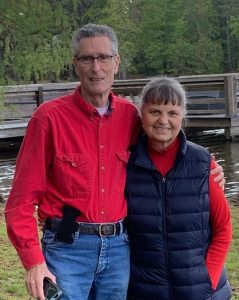
Russ and Beats
Russ got married to his beautiful wife Beatrice (or “Beats” as he affectionately calls her) just before starting his fourth year at Union College. Beats was then completing her training as a nurse. Beats and Russ met at Union College in Daniel class. They started dating and discovered they have a lot in common. Like Russ, Beats planned to be a missionary. They got married after two years, when Russ was a senior at Union college.
Two years out of college and after several disastrous pregnancies, the couple decided to adopt a child. God gave them a very special child, Latisha (picture below), whom they adopted when she was only four days old. Latisha was two years old when they moved to Tanzania. Latisha speaks Swahili with no shred of accent. She got so attached to Tanzania that she hoped to adopt a Tanzanian child when she grew up. She has remained attached to Tanzania since she lived there for twelve years. Latisha and her husband and child have visited Tanzania and enjoyed every single day they were there. She always got a kick out of the shock Tanzanians got when she spoke her sleek Swahili.
Beats and Russ are now 47 years into their marriage, and they have simple advice for young people – ask God to help you choose the right partner and once married, enjoy your partner, and be loyal to her or him, no matter what.
The Thomas Family moves to Tanzania
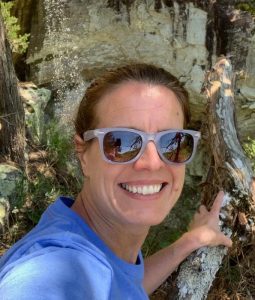 As a senior at Union college, Russell received a call from the Publishing Director of Colorado Conference asking him to work as his assistant, training both student and full-time colporteurs. He agreed and, in the process, learnt a lot more from his godly leaders about selling Christian books, and how to lead men and women. After two years in Colorado Russ and Beats accepted a call to do the same line of work in the Arkansas-Louisiana Conference. Two years later, the couple’s dreams of serving as missionaries came true in 1978 when they were called to serve as the Adventist Book Center Manager of the Tanzania Union.
As a senior at Union college, Russell received a call from the Publishing Director of Colorado Conference asking him to work as his assistant, training both student and full-time colporteurs. He agreed and, in the process, learnt a lot more from his godly leaders about selling Christian books, and how to lead men and women. After two years in Colorado Russ and Beats accepted a call to do the same line of work in the Arkansas-Louisiana Conference. Two years later, the couple’s dreams of serving as missionaries came true in 1978 when they were called to serve as the Adventist Book Center Manager of the Tanzania Union.
Entering a house on fire
The Thomas family arrived in Arusha in August 1978. They figuratively entered a house on fire. It was only one year since the East Africa community (EAC) was dissolved – creating daunting economic challenges in Tanzania. The border with Kenya had been closed to personal travel and commercial trading. Hardly two months after they arrived in Tanzania, Iddi Amin’s army invaded northwestern Tanzania on October 09, 1978 and annexed a 720 square mile area north of the Kagera River. Iddi Amin announced the annexed area is Uganda’s 9th province. President Nyerere was furious and on November 02, 1978 he declared war using his famous words “Tutampiga, uwezo wa kumpiga tunao, sababu za kumpiga tunazo, nia ya kumpiga tunayo.” Which loosely translates as, “We will fight with him, we have the power to fight, we have reasons to fight, and the resolve to fight with him.” Even though the Kagera war was only five months long (October 30, 1978-April 11, 1979), it led to one of the most difficult economic hardships in the country, and president Nyerere implemented an austerity budget, calling on Tanzanians to tighten their belts (kufunga mikanda). It was during this time that for an ordinary Tanzanian, even buying a toothpaste, soap, or cooking oil became a problem, because literally everything was in short supply.
But as President Kennedy once said, “When written in Chinese, the word ‘crisis’ is composed of two characters. One represents danger and the other represents opportunity.” Russ’s job in Tanzania was to establish and develop an Adventist Book Center (ABC) system to supply books to the 300 literature evangelists and 30,000 Adventists scattered across all of the country – a position he held for all twelve of his years in Tanzania. He opened ABC stores in each of Tanzania’s Fields, and opened branches, or Sub ABCs in thirty other towns.
The Tanzania Union ABC in Arusha got all its books from Africa Herald Publishing House located in Kendu Bay, Kenya. However, following the EAC breakup, Kenya and Tanzania’s trade relationships deteriorated, and Tanzania closed the border on its side. The resulting challenge, which affected ABC business, was that importation of any goods from Kenya was prohibited without a permit from the Economic Advisor to the President of Tanzania in Dar es Salaam. That permission had been granted a couple of times and then permission was refused before Russ’ arrival in Tanzania. Second, restrictions on foreign currency exchange were compounded by the economic hardships that the country experienced after the Kagera war. Russell Thomas senior was then the Publishing Director of the Afro-Mideast Division, based in Beirut, Lebanon. The two Russells worked hard with the manager of Africa Herald Publishing House and the Tanzania Union officers to find any method of supplying literature to Tanzania.
These challenges motivated young Russ to work hard and fast to bring books for Tanzania’s 300 literature evangelists. Indeed, the crisis forced Russ to think of innovative strategies to find alternatives. To address the book importation ban, Russ began bringing books “unofficially” from Kenya. This required miracles every month as the small volume of books delivered at first increased every month. With the Lord gave him favor with the border officials, unofficially quietly importing enough books to supply all the four ABC stores and their thirty branches in the Tanzania Fields.
On foreign currency exchange, the strategy which helped the ABC was to use SDA Church missions and tithe funds coming into Tanzania, diverting them first to buy books in Kenyan shillings. Upon importing the books into Tanzania, the ABC paid the value to the Tanzania Union for its use as tithes and missions offerings as usual.
In addition to opening ABC stores in all the larger towns of Tanzania, Russ actively participated in training colporteurs in collaboration with his mentor – Pastor Zakayo Kusekwa — and the two worked together for 12 years. By 1982, Pastor Kusekwa had trained and deployed 618 literature evangelists. (Currently there are over 2,500 literature evangelists.)
From Arusha to Morogoro
Trade restrictions on churches and NGOs were relaxed by the end of 1981. But currency restrictions remained tight as Tanzania’s economic woes following the Kagera War worsened. The nation’s inability to export and sell sufficient products to meet its growing needs for foreign currency caused shortages of many basic supplies. This led to the closing of business after business due to lack of imported raw materials or spare parts for machines.
At the same time, by the end of 1982 the demand for books by Tanzania’s growing army of literature evangelists, then numbering 618, had outstripped the amount of tithes and offerings coming to Tanzania annually. In fact, the Tanzania Union had bought and paid in Tanzania shillings for ten years of tithes and offerings into the future! That is when the General Conference Treasury department ordered the Afro-Mideast Division to cut off the flow immediately. That meant the death of the publishing ministry in the Tanzania Union if nothing were done immediately. At that time nearly one fourth of the baptisms each year were coming from literature evangelist contacts.
Rather than close its booming literature ministry, Tanzania Union leaders, at their yearend meetings voted to take emergency action to start printing in Tanzania as soon as possible. They chose to close the Union ABC in Arusha, and move it to Morogoro, merging it with the small commercial press operating there. By opening a publishing house in Morogoro, they would only need to import paper and printing plates. So, in 1983 Russ took up additional responsibilities as the Business Manager of Tanzania Adventist Press, carrying on as the Union ABC Manager from his office in Morogoro.
Russ, and his father at the Division office, which by that time had been moved to Nairobi, Kenya, started an aggressive fundraising campaign to get money for buying printing equipment. Fundraising was successful and they bought the equipment to increase printing capacity in Morogoro. Russ’s family moved to Morogoro in 1983. The press building was doubled in size to make room for the new machines. That was paid for by income from the Adventist Book Center’s sales. The little commercial press in Morogoro was turned into an NGO for church printing only. The press was organized as a finishing plant of Africa Herald Publishing House in Kenya. It kept the same name: Tanzania Adventist Press (TAP) but its capacity was doubled and then quadrupled after installation of the new equipment. TAP started printing small books like Sabato ya Kweli, Kujenga Unymba Wenye Furaha, and the Sabbath School Lessons, but soon expanded to larger books including Vita Kuu (an abridged Great Controversy), Danieli na Siku Zetu, and other small Ellen White books.
The huge problem the Tanzania Union faced when they were refused funds to import books God turned into a blessing. It forced them to start printing books within Tanzania and take the next step to develop a mature, self-sustaining publishing ministry.
Pastor Zakayo Kusekwa, a great man of faith, continued without pause training many more literature evangelists who loyally sold the small TAP books very quickly. This allowed TAP to prosper and grow in installing larger, faster, and better-quality equipment.
Pastoral Work
Even though Russ’s college training was in theology, his lifetime job has been in the publishing profession, which he learnt primarily on the job. But Russ used his pastoral training effectively during his time in Tanzania. When they moved to Morogoro, the Morogoro church didn’t treat them as guests the way the Burka church in Arusha had. Instead, the Morogoro church treated them as regular members and asked them to participate in regular church activities, such as leading out as the Adventist Youth (AY) leader of the church. “Mama Latisha” started the first Pathfinder club in Morogoro.
One rewarding assignment was opening a new branch. Russ was asked to serve as the elder of the new Chamwino company. They started using government primary school classrooms for church services, but within one month, there was an uproar with the Pentecostals, who were so loud during their services that the surrounding community requested the government to stop allowing them to hold church services in school building. The regional commissioner agreed and issued a decree prohibiting any religious use of classrooms for church services.
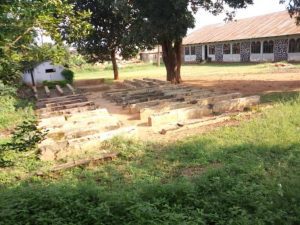
Church benches made of cement blocks under the mango tree. Of course, there was at the time walls made of sisal poles, and covered with a metal roof.
The Chamwino branch were given a small plot to construct a church building near broken septic tanks, with reeking sewer and foul smell. They accepted the plot, drained the smelly swamp, and built a little church using sisal poles. They poured cement for the floor, made benches using cement bricks, and plastered them to address the roughness and dust. They received from the Field office the roofing material from an old church nearby a military camp that had closed down. The little church building had no windows or doors. This was the rough beginning of the Chamwino church. The Chamwino branch was composed mainly of the 20-member Chamwino Choir, all of whom were high school graduate youth and young adults. Five other members constituted the rest of the company.
Their next problem was cows and goats, which entered the church to rest during weekdays. Since the youthful church was operating on a shoestring budget, they found used doors and this addressed the livestock problem.
Russ was very happy with the youth who were full of energy and innovative ideas. Soon after completing the construction of the church, the youth group suggested to Russ that they should conduct an evangelistic effort, in which the two elders of the church would preach. They raised money, bought Voice of Prophecy (VOP) lessons to distribute door to door, and printed handbills at TAP to promote the three-week evangelistic effort, which was conducted at the school building where they had started. Surprisingly, that was allowed. Every member helped to invite their friends and distribute literature. The choir came to sing every night and welcome guests. When the effort ended, they baptized only four people. Russ and the other elder were somewhat disappointed in the results. But the youth were not.
A few weeks later, during an AY meeting the young people suggested to Russ, who was also the AY leader, that AY should do another evangelistic effort and allow the AY to learn to preach and serve as the official choir of the event. The location of the evangelistic effort had to be approved by the main church, which assigned them to a tough neighborhood – which need Jesus more than other places. The evangelistic effort site was in Morogoro’s red-light district which had several local brew bars, and mostly broken-down mud houses with neglected, leaky roofs, and no electrical power.
So, the effort was conducted under a mango tree; Russ’s pickup truck and its battery were used to project videos and to power the loudspeakers. The little company raised the funds again to buy and distribute VOP lessons, print invitations, and all worked to invite the local community. The youth took turns preaching; the choir sang its enthusiastic best. The effort ended, and only one person was baptized!! Russ and other church elder were even more disappointed with the poor performance of the effort, but the youth were not.
During this time Russell was ordained as a minister of the gospel by the Tanzania Union during a special service at Tanzania Adventist Seminary and College (now Arusha University) in Usa River.
Soon after that, in the same year, 1987, the time came for Russ to go on his three-month furlough in USA. But before he left, the youth came to him and suggested that they would like to do a third evangelistic effort, and that Dorcas could lead it. Russ and other elder agreed. All the preparation and fundraising was done again, and Dorcas (all the girls in the choir) conducted the third evangelistic effort while Russ and his family were in the States. Of course, all the choir supported the Dorcas effort, so again all the members of the little company were fully engaged. That effort, building on interests from the previous two series, ended with 15 baptisms – an encouraging change that energized even the elders. Now the little company had 45 members!
The youth were even more energized and they wanted to do yet another series, but this time using an experienced preacher. They started looking for any ordained minister in Tanzania. In the process, a miracle happened. Pastor Joseph Onyango’s evangelistic effort in another part of Tanzania was canceled. He was aware that the Chamwino church was looking for a speaker and he offered his services to Chamwino. This was a big miracle because Pastor Onyango was a very well-known evangelistic speaker in Tanzania and the church at Chamwino did not expect to have such a prominent speaker at their small church. At the end of Pastor Onyango’s series, 42 people were baptized. The four evangelistic series were all made in one year and brought 62 new souls to Jesus, more than tripling the membership from only 25 to 87 by years’ end. By 1989, the company had been organized into a church of 125 members when Russ left Morogoro in June of 1990.
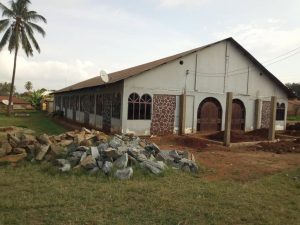
Mafiga church has constructed a much bigger church as seen in the picture to the left.
Russ and elders Magoti and Manumbu planted Chamwino church, and since becoming a company on January 01, 1989, Chamwino church has grown significantly. In 2000, it was divided into two churches. The church at the original location is now called Mafiga and has 400 members. The membership growth has been much higher than the Morogoro city population growth, which has grown 3.4 times from 122,000 people to 420,000 people in 2020. But the church growth at Chamwino is comparable with SDA church growth in the Morogoro metropolitan area. The Morogoro SDA church district has grown from one district in 1988 to seven districts – with over 25 churches in 2020.
Just before Russ left Tanzania, he talked with the church leaders, reminding them of their humble start with only five mature adults and a choir of young people. They had done a lot in two years and the youth had led self-sacrificingly in the church growth. Russ challenged them to do even more to spread the word. He pointed out to them that all the sacrifice and fundraising of the past few years had not impoverished them. I fact, all, looking around, agreed that they were better dressed and better off than before. All united in praising God and giving Him the glory.
As the progress reported above shows, the youth listened and kept preaching. When Russ visited Chamwino and Mafiga in 2004, he saw the progress that the church has made. He preached another full evangelistic series there, outside the unfinished new Mafiga church building shown above. The Chamwino/Mafiga area has become an Adventist cistern supplying the living water to the entire community. Under the dedicated leadership of Brothers Magoti and Manumbu, and later, other elders, more than fifteen other churches have been spawned by the Chamwino/Mafiga church since Pastor Thomas left.
Russ visited Chamwino again in 2019 and did not have a problem getting a venue for a Total Member Involvement venue since there were four churches in Chamwino area alone. That year he enjoyed superintending eight TMI teams preaching in eight venues in Morogoro.
Russell’s “retirement”
Upon his return from mission service in Tanzania, Beats went back into nursing while Russ went back to school to earn a B.S. in Business Administration at Union College, and an M.B.A. in International Business from the University of Nebraska. Upon graduation, Christian Record Services for the Blind, where Russ had been working part time, asked him to become their production manager, an offer which he joyfully accepted.
After serving for almost 25 years as the Production Manager at the Christian Record Service for the Blind Russ “retired” and moved to Arkansas. However, this didn’t mean retirement from serving the Lord, just the opposite. In fact, he is even busier and traveling more extensively than when he was working at Christian Record. He has taken advantage of the small town newspaper death spiral to buy printing equipment at reduced prices and ship them to Adventist publishing houses around the world. In the past 15 years alone, more than 1,400 US cities and town print newspaper have been shuttered – creating a big opportunity for securing their publishing equipment for God’s work in developing countries.
Russ and HeReturns have been fundraising aggressively to secure resources for buying and shipping printing equipment to Africa, the Middle East, and the Cuba. Following are the projects that Russ has been doing since his “retirement.”
Ufunuo Publishing House in Morogoro (formerly Tanzania Adventist Press, TAP):
There have been several big upgrades of the TAP since Russ left in 1990. The Press purchased a huge 4-color Komori printing press, and installed much larger folding machines to match. Editorial and translating departments have been added, and the humble little press Russ left has now been upgraded to full publishing house status, reflected in its new name, Ufunuo Publishing House. Praise God!
Christian Record Services ceased its printing operations at the time when Russ retired. They agreed to sell some of the machines to Russ for $54,000. Russ did fundraising to buy and ship the equipment to Tanzania, and in 2017, the new Ufunuo Publishing House (UPH) received the equipment.
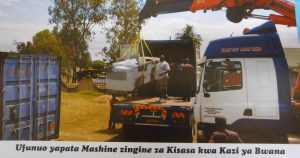
Yona Mbwana (man in white t-shirt) and his fellow workers offloading the Kodak Creo Trendsetter from Christian Record, a part of the computer-to-plate system, in 2017.
After completing that first project working independently and using the local Adventist church to receive donations, Russ decided to join forces with a small ASI-member ministry called HeReturns—an Adventist lay ministry dedicated to spreading the Gospel by any mass media possible like TV broadcasting, radio, and literature.
Russ didn’t stop when this big achievement was realized. For years, Ufunuo Publishing House (Ufunuo means “Revelation” in Swahili) has printed books, magazines, and other literature on sheet-fed presses – at first small, single-color presses, and then larger, multi-color presses. Now even those are not able to keep up with the demand for gospel literature.
Now Russ is working on a project to refurbish a donated newspaper web press for Ufunuo Publishing House. Meanwhile UPH is working hard to build a building large enough to house and operate it efficiently. A web press prints from a huge 40-inch wide continuous roll of paper at a much faster rate than sheet-fed presses do. Web presses are used for newspaper printing and other high-volume, high-speed production. A web press like that donated can produce thousands of newspapers in a single night. The difference between a conventional and web press is like the difference between propeller plane and a jet, or a bicycle and a motor scooter! Ufunuo Publishing House’s largest press is a 40-inch wide 4-color press. It can print an impressive 160,000 pages per hour. But a web press can print nearly 1,000,000 pages per hour! That’s equivalent to 7,800 standard ABC books, or 1,000 Bibles—every hour!
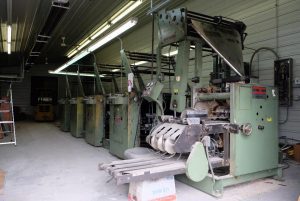
Web press machine from Tecumseh Chieftain
HeReturns has been offered such a press by a small-town newspaper – the Tecumseh Chieftain in Tecumseh, Nebraska whose pressman has retired. Unable to attract another trained pressman to a small town who is also willing to live on the small-town wages, they are now forced to ask another newspaper press in the next town to print their newspapers—leaving their nice web press idle. The press is an ATF News King, which is in in good condition and the right size for printing the text pages of books and Bibles. Instead of hundreds of books per day, it can print thousands of books per day. This News King press also folds the paper inline and cuts it apart without stopping, as fast as it prints! With the two bookbinding machines, which HeReturns has already sent to Morogoro, Ufunuo’s bindery team is equipped to keep up with that amazing growing demand.
The web press hasn’t yet been shipped to Morogoro, but fundraising is ongoing and God willing, the machine will soon be on its way to Morogoro. It will cost about $40,000 to refurbish the four printing units and another $15,000 to $18,000 to ship it to Tanzania.
Supporting publishing houses in other countries and regions
Middle East: Even though Christianity started in the Middle East, the region remains one of the most gospel-resistant areas in the world, mainly due to the religious restrictions in the predominantly Islamic countries. Religious freedom is spotty, and proselytization is forbidden. Even changing one’s religion is strictly forbidden in most countries. Consequently, the Middle East and North Africa accounted for only 3% of 21.6 million Seventh Adventists in 2019, even though it accounted for about 7% of the global population in the same year. This doesn’t scare battle-tested Russ to go share the good news of Jesus Christ through literature. But this must be done quietly and prayerfully.
In 2017, Russ and his colleagues from HeReturns.org started helping to upgrade a startup printing press in the Middle East to become a larger commercial press capable of printing Adventist literature. This project is facing significant opposition from the devil. But prayer can move mountains of difficulty. Please join in praying for this quiet project.
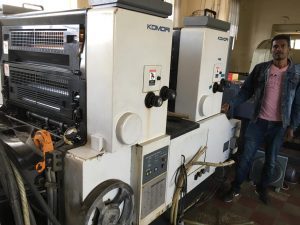 Ethiopia Adventist Press: Russ and HeReturns are leading an effort to modernize the Ethiopia Adventist Press (EAP). The pressing challenge of the EAP is the growing literature demand from a population of over 100 million people, and 200,000 Adventists. EAP capacity remained unchanged for the past 30 years since the overthrow of Emperor Haile Selassie by 30 rebellious generals. Since that time the country has been ruled by communist-style governments which have kept a relentless pressure on all religious groups in the country, especially Protestant Christians. The equipment operating at EAP in 1974 is mostly still in use. Through careful, loyal maintenance, and God’s intervention, it has been kept going, so it has certainly outlived its maximum expected service life. Russ and HeReturns stepped up in 2018-19 to help EAP meet its most urgent needs – including a paper cutter, a binding machine, two 2-color offset presses, and other vital equipment.
Ethiopia Adventist Press: Russ and HeReturns are leading an effort to modernize the Ethiopia Adventist Press (EAP). The pressing challenge of the EAP is the growing literature demand from a population of over 100 million people, and 200,000 Adventists. EAP capacity remained unchanged for the past 30 years since the overthrow of Emperor Haile Selassie by 30 rebellious generals. Since that time the country has been ruled by communist-style governments which have kept a relentless pressure on all religious groups in the country, especially Protestant Christians. The equipment operating at EAP in 1974 is mostly still in use. Through careful, loyal maintenance, and God’s intervention, it has been kept going, so it has certainly outlived its maximum expected service life. Russ and HeReturns stepped up in 2018-19 to help EAP meet its most urgent needs – including a paper cutter, a binding machine, two 2-color offset presses, and other vital equipment.
Russ and HeReturns were praying for a printing press for a cheap price. Again, they decided to make a trip around small cities to explore the possibilities of buying printing equipment from small town printers which are dying due to the onslaught of online publications and the inroads of digital copiers. When Russ and HeReturns visited the town of Friend in eastern Nebraska, they found a printer sympathetic to the goals of HeReturns’ ministry. He agreed to sell his beautiful 2-color Heidelberg Quickmaster QM-46 offset press for only $1,000 – a giveaway price since he bought it new in 2002 at a price of $75,000. He also literally donated other equipment. That press is now in Ethiopia.
All of the “new” equipment in Ethiopia is awaiting a visit by Cliver Mbwana, the talented Production Manager of Ufunuo Publishing House who will install the machines and connect the electricity.
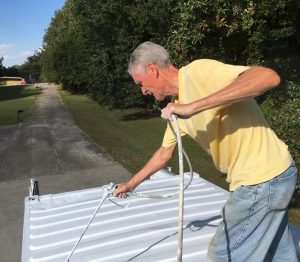
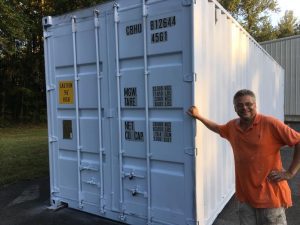

Malamulo Publishing House (MPH), Malawi: Malamulo, which means Commandment – was founded almost 120 years ago (1902), one of the first Adventist presses in Africa. MPH prints mainly Adventist literature and its equipment has gotten old while demand has been driven by the growing Adventist population, which now stands at 572,674 members, almost a threefold increase from its membership of 165,000 in the last 25 years. Russ and HeReturns have secured an offset printing press and an automatic-feed perfect binder for binding square-backed paper-cover books. God has given them over $15,000 to purchase and ship the container from Auburn, Nebraska to Blantyre, Malawi. This will significantly improve the publishing at MPH.
After painting the container with his friend, volunteer Tony Chavez, and loading this container with the help of six other volunteers, it was shipped on the pictured container ship. CMA CGM shipping line’s Christophe Colomb is transporting it from New York to Nacala, Mozambique. From there, it will go by rail to Blantyre, Malawi.
Another container to carry a folding machine, a guillotine paper cutter, and a 3-knife trimmer for trimming big books is needed still. Those items are expected to cost around $55,000. Pray for that need in Malawi.
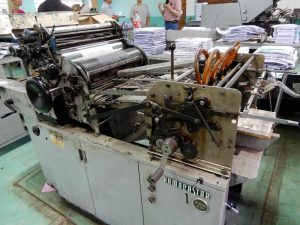 Cuban Union Press: In his youth, Russ was groomed by God to serve in countries restricted by communism. He lived under the long shadows of North Korean communism during his childhood in South Korea. So, he jumped to an invitation from Mike Wells of Wells Graphics to join him on a trip to Cuba to assess the antiquated and small printing operation there (pictured below). The Cuban Union Press needs book-binding equipment, plate-making equipment, and a bigger press.
Cuban Union Press: In his youth, Russ was groomed by God to serve in countries restricted by communism. He lived under the long shadows of North Korean communism during his childhood in South Korea. So, he jumped to an invitation from Mike Wells of Wells Graphics to join him on a trip to Cuba to assess the antiquated and small printing operation there (pictured below). The Cuban Union Press needs book-binding equipment, plate-making equipment, and a bigger press.
The Lord led Mike Wells to a bookbinding machine in Miami, Florida which he and Russ purchased for Cuba with help from a generous donor.
However, the Cuban government says it does not allow importation of printing equipment—especially by churches. For those items which are allowed in the country, a series of bureaucratic holdups can require months of processing to secure permission to import. So HeReturns and other partners went to their knees to pray for yet another miracle.
The Cuban government refused the Cuban Union President’s request for an import permit.
But Pastor Silvio, the new Press Manager said the solution would be three-fold: “Pray, Insist, Repeat.” All concerned persisted in prayer asking God to intervene. Then the shipping agency mistakenly sent the machine off from Florida without permission from the Cuban government. The equipment was shipped via Panama and for a long time it appeared to be lost. All feared that wherever it was it would be accumulating unaffordable storage charges. One day, their surprise, Russ and his colleagues were informed that the machine has been delivered in Cuba in a matter of only two months, and that the Cuban government has approved the import! Miracles still happen today.
Russ’ “retirement” has been very productive in supporting publishing houses in Tanzania and other developing countries. We may learn from Russ’ commitment, pray for him to continue serving our Lord, and join him in his projects, or in doing something similar—or bigger—in God’s power.
TAUS Engagement
Russ has been engaged in TAUS since 2017 when he attended the TAUS retreat in Wisconsin. He liked this organization and will fully participate in its activities. I asked him to offer any advice on how the organization could succeed in resource mobilization from SDA churches in USA. He advises that TAUS members should actively involve themselves in local church activities. This will open windows for speaking about TAUS activities and appealing to church members to support TAUS activities and ministries. TAUS members could ask for permission to present the opportunities before TAUS during Sabbath school in well-prepared presentations to encourage members to contribute to specific projects. For example, the presentation done in Wisconsin on training pastors is very compelling and it would surely lead to significant contributions. For example, HeReturns has helped Nathanael Kipanguli – a pastor in Zanzibar — where the pastor, with only a little financial assistance from HeReturns, has built a school, and competed two churches.
Russ also suggests that Tanzanians wear Tanzanian clothing to church to reflect Tanzania’s rich culture, arouse an interest, and open the door to tell stories from Tanzania in their local churches.

